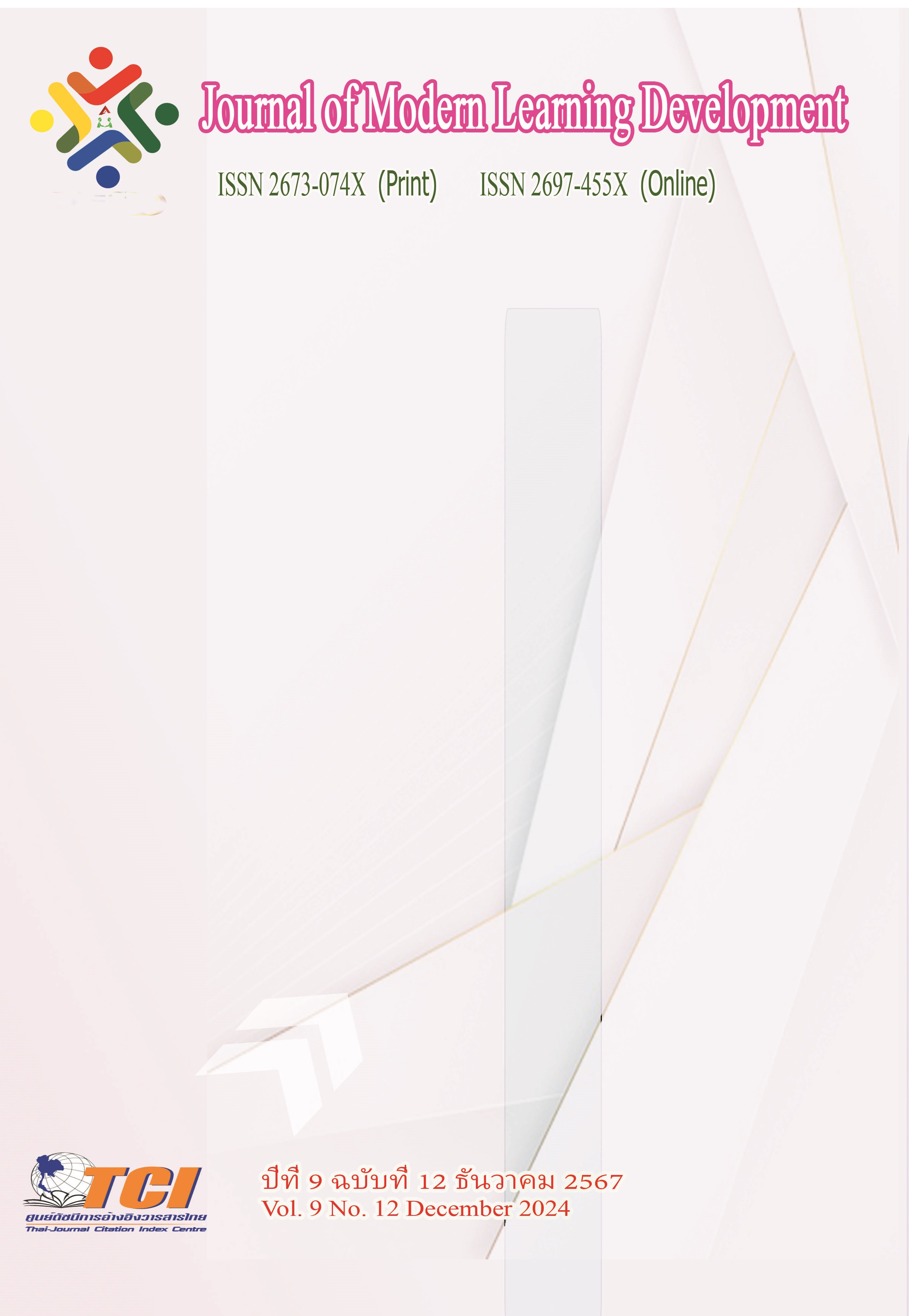A Study the Hakka Folk Song for Writing Hakka Folk Songs Vocal Guidebook
Main Article Content
Abstract
The Hakka people have a unique culture. The main unique feature is the language, which differs in each area. As a result, they have different tones, including the folk song. Hakka folk songs of Hezhou City are diverse and rich in content, covering labor, life, love, festivals, and more. Hakka folk songs of Hezhou are commonly sung during work, festivals, and celebrations. These activities are designed to boost morale, relieve fatigue, and enhance enjoyment. But in the present, they are nearly extinct and corroded because of cultural impact and because there is no widespread inheritance. There is probably only one teacher in the school. But teachers do not have knowledge and understanding because they have no direct knowledge.
This research was to study the Hakka folk song from key informants and write a Hakka folk song vocal guidebook. Qualitative research methods were utilized in this study. Researcher studied a book, article, thesis, and research report. Information was gathered from four key informants with expertise in Hakka folk song traditions from Hezhou, China, through in-depth interviews. This information was then analyzed to writing the Hakka folk song vocal guidebook which subsequently evaluated by three experts.
The research found that the Hakka people, residing in southern China, have a distinct culture that is evident in their work and way of life. In Hezhou City, the Hakka community maintains a robust cultural heritage, particularly exemplified through their folk singing traditions. These songs, which have been passed down through generations, highlight the importance of language use and pronunciation. They are characterized by specialized techniques such as controlled breathing and vocal execution, including throat sounds and staccato singing. Four key informants, who are direct inheritors of this tradition, recommended 16 songs to be included in a guide to Hakka singing. These selections cover a range of themes, such as homesickness, love, work, rainy days, festival celebrations, Hakka identity, and the beauty of nature. The guidebook is organized into four sections: 1. Overview of the Hakka 2. Hakka Folk Songs in Hezhou 3. Hakka vocal skills 4. Hakka Folk Songs Vocal Guidebook, which includes explanations of the songs' origins, sheet music, and singing methods. This guidebook was created through the study and collection of information from the descendants of Hakka folk songs. It presents a singing method that outlines specific skills and techniques. Singing Hakka folk songs has a distinct identity, contributing to the creation of values and the preservation of cultural heritage. This research can be utilized for teaching and dissemination purposes.
Article Details
References
Chen S. (2015). Background Analysis of Hakka folk songs. Folk Music, 5(2).
Chen Z. (2013). Research on Inheritance and Innovation of Jiangxi Hakka Mountain Folk Song Singing. Res Militaris Socil Sciene Journal, 12(2).
Conghua Guangzhou. Hakka Folk Song. Online. Retrieved July 3, 2024. from : http://guang zhou.chinadaily.com.cn/conghua/2021-05/11/c_619733.htm
Hongqian W. (2023). Xiu hebao folk song:Compiling the Exercise Book for Piano Accompaniment. [master degree dissertation]. Bangkok Thonburi University.
Jiaqi C., & Xiran S. (2023). Brief Discussion on the Function of Padding Syllables in Chinese Hakka Folk Songs: A Case Study of "Fame of Hakka Folk Songs". Art and Performance Letters Clausius Scientific Press, 4(7).
Lai C. R. (2013). Transmission and Education of Hakka Folk Songs in Hong Kong: Distinctiveness and Commonality in Local, National, and Global Contexts In Samuel Leong & Bo Wah Leung (Ed.), Creative Arts in Education and Culture (pp. 171-188). Springer.
Li Q. (2019) Research on the Inheritance and Development of Guangdong Hakka Folk Songs [proceeding]. 2019 International Conference on Art Design, Music and Culture (ADMC 2019), UK.
Qinliang N., & Sakon P. (2023). The Singing Art of Hakka Folk Songs in China. The Journal of Pacific Institute of Management Science, 9(1).
Salinthip S. (2021). The Techniques Study and Practice Methods of an International Music Singing of Phrimaphaa Khornrojjanachawin. Bansomdej Music Journal, 3(2).
Wang D. (2022). Emotional expression in vocal skill from the perspective of multiculturalism. Música Hodie, 22(2022).
Wang R. (2021). Application of the Singing Techniques in Oroqen Folk Songs Teaching withthe Help of Multimedia Technology. Journal of Physics: Conference Series, 1744(2021).
Wei Z. (2010). Hezhou Hakka. Guangxi Normal University Press.
Wenwen Y., Surasak J., & Veera P. (2024). The Identity of Gannan Hakka Folk Songs in the Southern Gan River Basin in Jiangxi Province. Journal of Multidisciplinary in Humanities and Social Sciences, 7(2).
Yang L., Nayos S., & Chutasiri Y. (2023). The Guangzhou Modern Opera Performance Book. Journal of Roi Kaensarn Academi, 9(4), 738.
Zulong W. (2023). The Development and Application of Vocal Music Skills: A Case Study of Chinese Vocal Learners. Highlights in Art and Design, 4 (3), 66.


